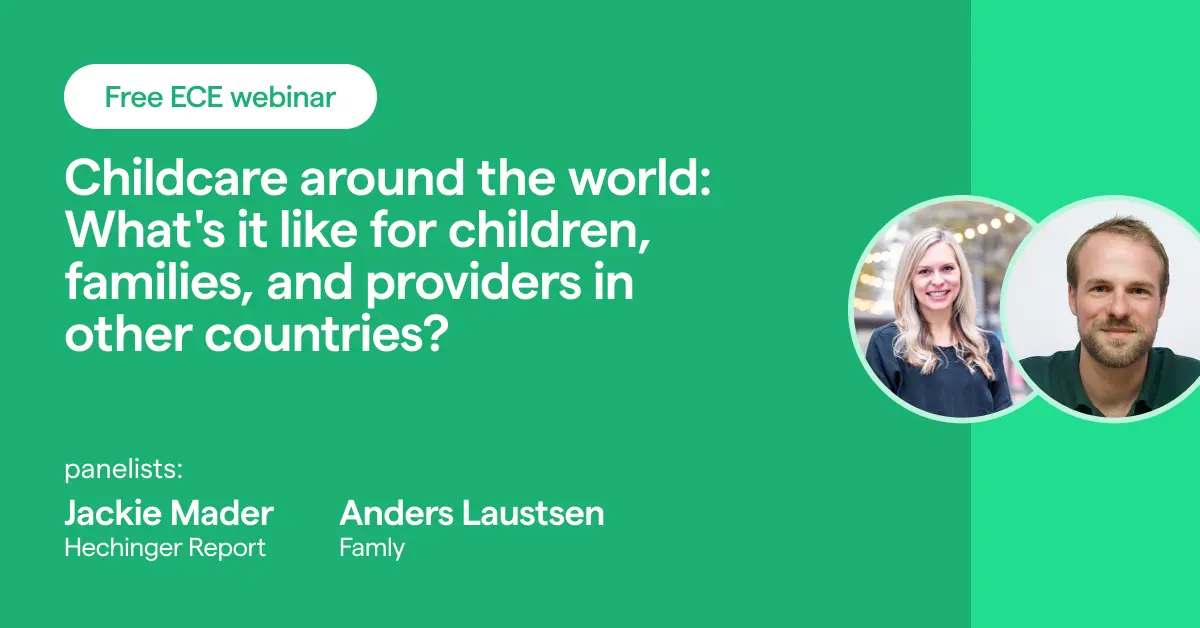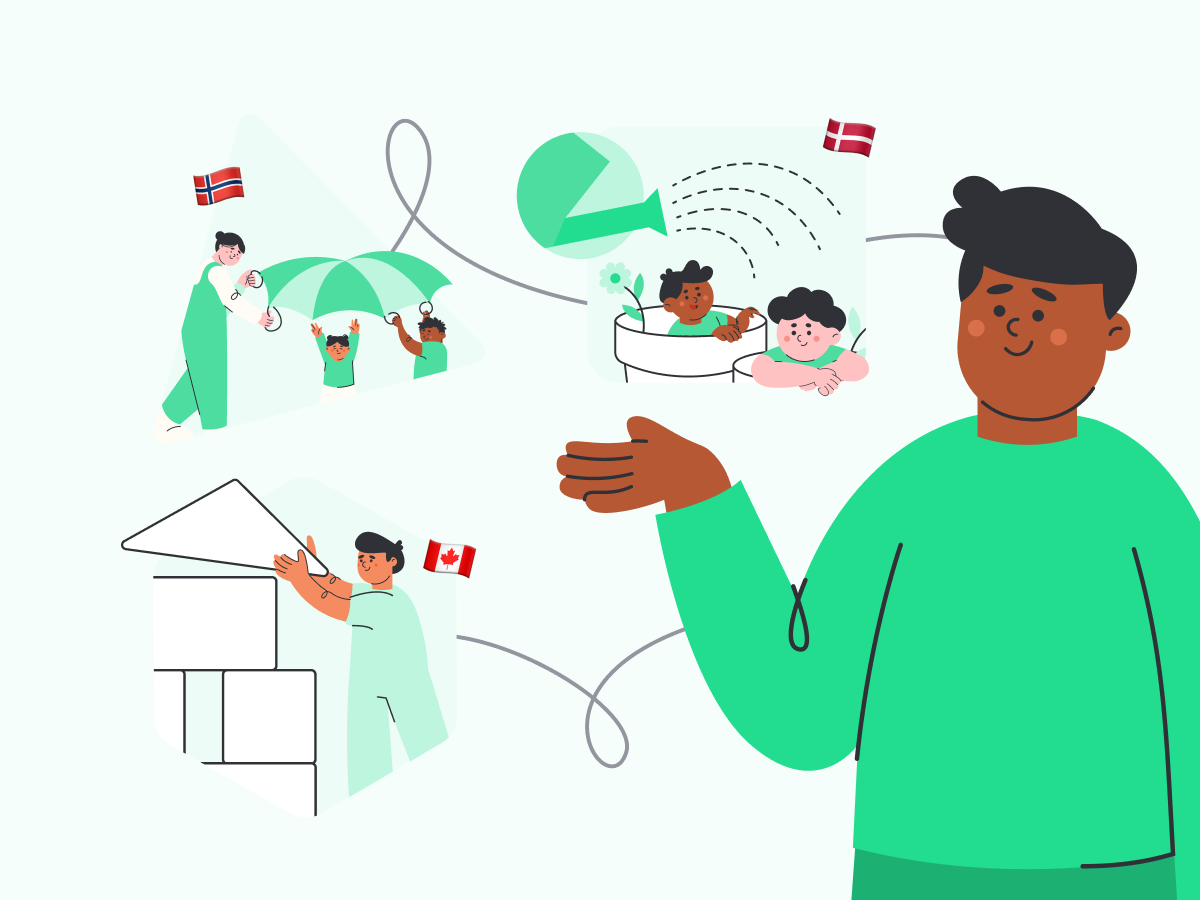settings
children
With Famly since
Why talk about childcare around the world?
Childcare in the U.S. is... complicated (for lack of a better word). And as we push for real change, looking outward is a great place to find inspiration.
What’s working in other countries? What’s not? Is free childcare the ideal answer? Should curriculums focus on play-based learning or more formal academic lessons, and specific milestones? What about the role of parental involvement? And most importantly: what’s it actually like to be a director, educator or parent, in those systems?
That’s exactly what we explored in a recent live panel with:
- Anders Laustsen, CEO and Co-Founder of Famly, an international childcare management software, with a large customer presence across the US, UK, Germany, and Scandinavia. He also has two daughters, one in preschool and one in Kindergarten, and they have been enrolled in childcare in Denmark and the US. So both professional and personally, Anders is no stranger to early childhood education around the world.
- Jackie Mader, Senior Early Childhood Editor at the Hechinger Report, and before her multi-award journalism career, she worked as a special education teacher in Charlotte, North Carolina, and trained new teachers in Mississippi. She has spent extensive time in Norway, Canada, and in various states across the US, personally interviewing and deep diving into the complexities of childcare policies.
Together, they gave an in-depth look at how childcare actually looks in Denmark, Norway, Canada, the U.S., and a bit of the UK - from a personal and a professional perspective.
The best part for me? I had done a ton of research on global models of early education, but that provided me with little insight on the actual experience of each system. I still wanted to know, boots on the ground, what is it actually like? Jackie and Anders provided some answers, and opened my eyes to a whole lot more.
You can (and should!) watch the full webinar here. But if you want a little teaser, here are a few of the most surprising takeaways.
What I learned from Jackie Mader and Anders Laustsen
1. Cost: even more than I expected!
I expected: the cost of care to be, on average, more expensive in the U.S.
I didn’t expect: just how much more expensive.
Anders broke it down clearly and powerfully:
“I pay six times as much in Washington D.C. as I did in Copenhagen for the same number of hours in care.”
Yes, D.C. is expensive, but so is Copenhagen, and still, the price gap is shocking.
Another reason Americans pay more? Children often start earlier. In the U.S., childcare can begin as early as 6 weeks, when the limited leave ends, as there is no federal paid leave. In countries like Denmark or Norway (and most other European countries), care usually starts closer to 10–12 months, thanks to longer, subsidized parental leave.
The big ideas
Jackie shared this moment from a reporting trip to Vancouver in 2023:
“The director took me into one of the childcare programs and said, ‘This is our infant room,’ and I was like, ‘Where are the infants? These are toddlers.’
The response? “Well, they're at home, we have maternity leave.”
It’s a simple point — but a powerful one.
Jackie had a similar experience in Norway too:
“I met with this one teacher in Oslo and I mentioned to her, ‘I don't see any babies in your programs,’ and she said, ‘Oh I would just love to take care of a baby all day,’ and I said, ‘Well, in America, you'd have 4-to-6 babies all day,’ and she was like ‘Oh no no no no no.”
Then we got started on the topic of ratios, and we learned about a country that doesn’t even have them! Yup, you read that right. Watch the webinar to find out which country it is.
2. Cultural similarities (and surprises)
I expected: Scandinavian countries to have very similar childcare systems (like Norway and Denmark)
I didn’t expect: Norway’s system to be more progressive in key ways.
It is true that there are a lot of similarities across the Scandinavian countries, like, similar maternity leave, a more play-based approach to learning with a lot of emphasis on time spent outdoors, and both heavily subsidize the cost of care.
But Norway’s childcare system distinguishes its childcare system in other ways.
How? Well, Jackie has spent a lot of time in Norway visiting childcare centers and interacting with the staff. She explained that:
- Childcare is a legal right for all children once they turn 1 years old.
- The Kindergarten Act protects a child’s right to joy, not just academic growth.
- There are a lot of male childcare workers in Norway.
- Parents have a legal right to be involved, and many help directly at the center. As Jackie claims, “It did seem like a shared social responsibility.”
Anders shared from his personal experience as being a parent of a child enrolled in both the American system and the Danish system:
“There's so much more involvement expectations for parents to donate, and get involved, and volunteer like in the U.S., as compared to…in Denmark you'd be like, ‘I'm paying my taxes, [so] society can take care of everything else.’”
Watch the webinar to see how parents in different countries feel about how engaged and involved they should be in their child’s time at childcare.
3. Educator respect is still a global fight
What I expected: Countries that fund care better also respect educators more.
What I didn’t expect: The struggle for respect is still global.
Jackie said that through her research, Norway seemed to have the happiest childcare workers. Yes, she admits it’s a small sample size, but it is highly qualitative research. Several said they are paid comparable to other public workers and a draw of the job is getting so much time outside with children.
Still, educators in Norway told Jackie about their struggle to be acknowledged for the invaluable work that they do each and every day. They explained to her,
“Up until a few years ago, childcare educators were often referred to as ‘aunties,’ and to them, that reflected a lack of respect.” Similar to America, the educators are “trying to get people to understand this isn't babysitting. This is really critical early care and learning.”
“It was interesting hearing that in Norway - even though they are paid better than in America and there is more of a societal understanding of the importance of early learning - they still felt that lack of respect.”
Anders confirms from his experience:
“Whether it's Germany, Denmark, the UK or U.S., the teachers are underpaid, and they don't feel that the profession is as respected as it should be, and I agree…I think fundamentally it starts with a lack of understanding of how important first five years is that leads to lack of appreciation…I think that's also why we see the fights in the U.S. about should we use the ‘daycare’ word or should we not. In the UK they have a similar thing about do we call it ‘practitioners’ or should we call it ‘teachers.’”
Watch the webinar to hear how Anders is building Famly’s software to help gain respect for educators, and all the work they do each and every day.
And finally, Jackie shared salary data from OECD, and although training, titles, pay scales, and autonomy vary widely, educators feel underpaid and under-respected in all of the listed countries. Definitely check out this part of the webinar. It was powerful.
There’s so much more to the full conversation
This was just a glimpse into an incredibly eye-opening conversation. Watch to hear and learn more about:
- What makes a child care system (and who actually has one)
- Why "free" care isn’t always straightforward
- How language, culture, and policy shape what we expect from educators
- The complicated tradeoffs between public and private models
Watch the full recording here and let’s help bring awareness to the early childhood sector, and do what we can to spark positive change.

Get a personal demo now
Get a guided 1-on-1 tour of the whole platform. See what features are the best fit for you, and ask us as many questions as you like.
Book free demo






.webp)

.webp)

